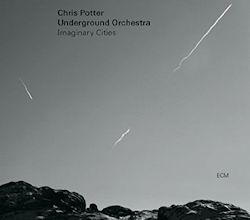Lament
Imaginary Cities 1 - Compassion
Imaginary Cities 2 - Dualities
Imaginary Cities 3 - Disintegration
Imaginary Cities 4 – Rebuilding
Firefly
Shadow Self
Sky
Chris Potter (tenor and soprano saxophone, bass clarinet), Adam Rogers (guitars), Craig Taborn (piano), Steve Nelson (vibraphone and marimba), Fima Ephron
(bass guitar), Scott Colley (acoustic bass), Nate Smith (drums), Mark Feldman, Joyce Hammann (violin), Lois Martin (viola), David Eggar (cello)
Recorded December 2013 Avatar Studios, NYC [71:14]
This adventurous album manages the seemingly impossible achievement of meshing a string quartet with a jazz ensemble in way that defies both the word
‘mesh’ and , indeed the whole concept altogether. Chris Potter’s Underground Orchestra, whose debut album this is, takes his Underground Quartet - himself
on saxes, with piano, bass and guitar - and enlarges it via the inclusion of vibes (and marimba), bass guitar, double bass, and string quartet. The result
is a genuine entity, a fully-functioning ensemble that is not beholden to any constituent part.
Imaginary Cities
is the main focus of the orchestra, a four-movement suite of rich contrasts and aural excitement, in which integration of texture is a given. That said,
there are plenty of opportunities for solos – as in the opening movement, Compassion. In Dualities, the second movement, the pizzicato
strings summon up nothing less than brilliantly updated Debussy whilst Potter’s angular sax lines and the fast marimba solo from Steve Neklson, bring a
complex layer of colour and rhythm to this especially intriguing narrative. Sometimes harmonically allusive, as in Disintegration (movement
three), there is also a quiet melancholy at work, not least from the strings in what one would, I suppose, conventionally call the slow movement of this
suite.
Shard-like motifs are Potter’s metier, as are intriguing colouristic conjunctions, rhythmic patterns – Firefly embodies all these elements which
never conflict, only accumulate and deepen the sense of rich complexity in the music. Shadow Self is a witty dance, with a wild first violin line
rich in folkloric influence – a touch of Bartók here, maybe, something picked up in the darker colours of Potter’s bass clarinet. Sky is a catchy
way to end this disc.
From the lyrically expansive opener, Lament, through the four-movement suite, this is in every way a superb recording. It sets the bar very high
for subsequent releases from this group.
Jonathan Woolf
